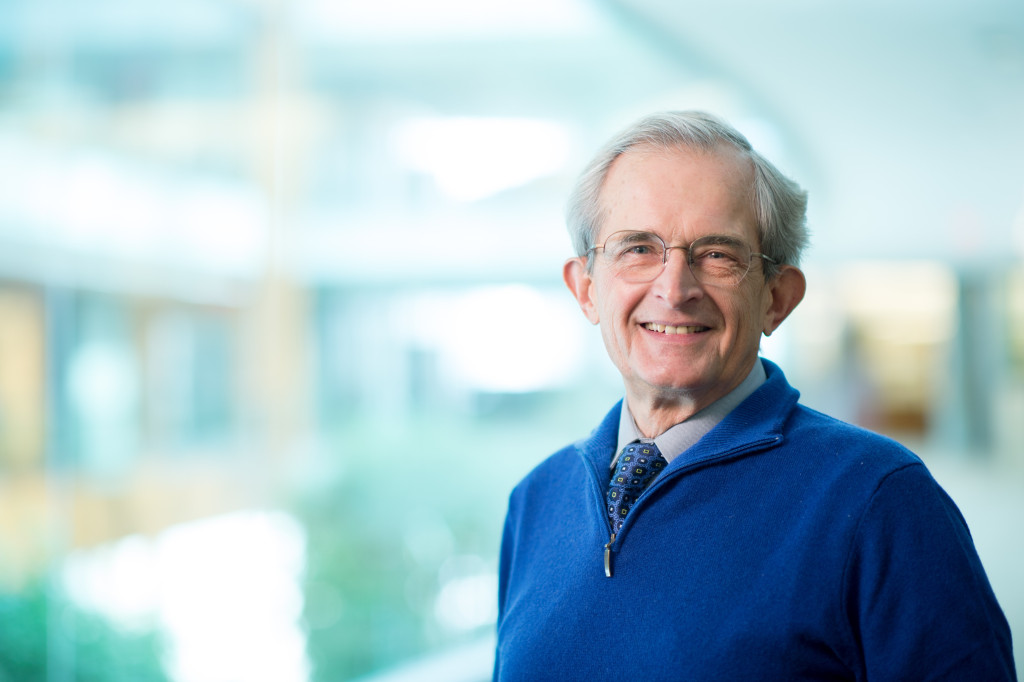UW professor emeritus who paved the way for at-home colon cancer testing and other screenings earns national recognition
Millions of Americans have completed the at-home Cologuard screening test for early signs of colon cancer. Among the first people to thank for the widely accessible, potentially life-saving tool is James Dahlberg.
The University of Wisconsin–Madison professor emeritus of biomolecular chemistry combined basic science discoveries with an entrepreneurial vision that has brought several types of health screenings to homes and hospitals everywhere.
Earlier this month, the Bayh-Dole Coalition awarded Dahlberg the American Innovator Award, recognizing his commitment to advancing federally funded inventions from the laboratory to real-world applications.
Dahlberg’s research at UW–Madison, and partnership with the Wisconsin Alumni Research Foundation and chemistry professor Lloyd Smith, led to the founding of Third Wave Technologies, the creation of several other startups and the rise of Madison-based Exact Sciences.
“WARF is delighted to celebrate Dr. Dahlberg for this well-deserved honor,” says WARF CEO Erik Iverson. “His remarkable scientific expertise and dedication to bringing his technology to market have played a crucial role in Wisconsin’s emergence as a rapidly growing biohealth tech hub.”
Dahlberg joined the UW–Madison faculty in 1969. While studying DNA molecules that fold into shapes other than the now-familiar double helix, he found that an enzyme used to make copies of DNA could also cut the unusually shaped DNA strands into pieces.
The DNA-cleaving technique wasn’t the initial goal of his lab’s federally funded work, but Dahlberg couldn’t help but linger on its possibilities. The enzyme, called Cleavase, could be used to detect slight genetic differences, like the ones that make a particular variant of cancer more dangerous than its cousins.
Licensing the Cleavase patents from WARF, Third Wave Technologies developed a test for human papillomavirus, known as HPV, that could sort relatively innocuous strains from the ones that are the leading cause of cervical cancer. Exact Sciences — employing many Third Wave scientists — turned the enzyme techniques into Cologuard, which has screened more than 19 million people for the second-most deadly type of cancer.
“Dr. Dahlberg’s story underscores the importance of the Bayh-Dole Act, which enabled him to transform his research into a practical solution by launching his own startup,” says Joseph P. Allen, executive director of the Bayh-Dole Coalition.
The Bayh-Dole Coalition is a group of innovation-oriented organizations and individuals committed to celebrating and protecting the 1980 Bayh-Dole Act. The law, championed by senators Birch Bayh of Indiana and Bob Dole of Kansas, allows universities and other organizations to capitalize on federally funded research to create consumer products, bolstering the economy and employment and scientific progress.
Dahlberg, who also founded Cambridge BioTech Corporation, is an inventor on 37 U.S. and international patents. He has served as interim director of the Morgridge Institute for Research and science adviser to former Wisconsin Governor Jim Doyle, and is a member of the National Academy of Sciences, the American Academy of Arts and Sciences, and the European Molecular Biology Organization. He retired in 2005.
“Dr. Dahlberg followed basic research down a path that led to discovery and delivered on the promise preserved in the Wisconsin Idea — to improve lives beyond the university’s borders,” says Dorota Brzezinska, UW–Madison vice chancellor for research. “He is a pioneer who entered the biotechnology industry in its infancy and made a big impact on that industry, and our ability today to diagnose and treat diseases such as cervical and colon cancer for millions around the world.”
Research at the University of Wisconsin–Madison drives innovation, saves lives, creates jobs, supports small businesses, and fuels the industries that keep America competitive and secure. It makes the U.S. — and Wisconsin — stronger. Federal funding for research is a high-return investment that’s worth fighting for. Learn more about the impact of UW–Madison’s federally funded research and how you can help protect it.





